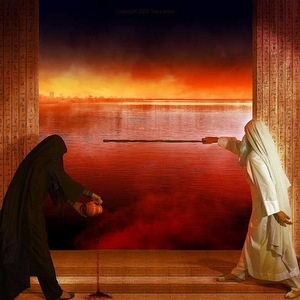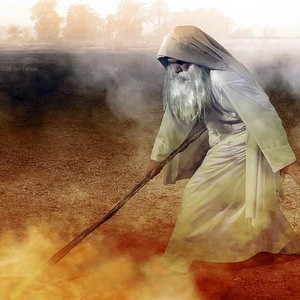| << Previous (Shemot) | Next (Bo) >> |
The Hebrew Word
The name of this week's parashah, וארא [va'eira], is a conjugation of the Hebrew root word רָאָה [ra'ah- Strong's #7200]. It is a primitive root verb that means "to see." Ra'ah is used 1308 times in 1198 verses in the Tanakh. It is the same root word that forms the name of Parashah Vayera.
First use in Scripture
The first time ra'ah is used in Scripture is in Genesis 1.
G-d saw that the light was good; and G-d separated the light from the darkness. (Genesis 1:4)
Last use in Scripture
The last time ra'ah is used in Scripture is in Malachi 3.
So you will again distinguish between the righteous and the wicked, between one who serves God and one who does not serve Him. (Malachi 3:18)

Parashah Outline
- Heads of Israel - Exodus 6:14
- "I Will Stretch Out My Hand" - Exodus 7:1
- Aaron's Rod Turns Into a Serpent - Exodus 7:8
- Water Is Turned to Blood - Exodus 7:14
- Frogs Cover the Land - Exodus 8:1
- The Plague of Insects - Exodus 8:16
- Egyptian Cattle Die - Exodus 9:1
- The Plague of Boils - Exodus 9:8
- The Plague of Hail - Exodus 9:18

My Plagues of the Exodus article examines each of the plagues in detail.
Portraits of Messiah
Pending
Other Observations
G-d's Special Name
At the beginning of the parashah, the Torah tells us that G-d speaks to Moses and tells him that He did not make Himself known to the patriarchs by his Name, י-ח-ו-ח. We find, however, in Genesis 21:33 that Abraham plants a tamarisk tree at Beer-Sheva and calls on the name י-ח-ו-ח. If G-d did not make this name known to Abraham, how could he call upon it? Did Abraham pull a Rumpelstilskin and guess His name, or did someone else tell him? This ties directly to the notes from last week's parashah on G-d's Name.
Note that the Torah tells us that G-d said He did not make Himself known to the patriarchs by this Name. It does not say He did not make His Name known to them. This speaks more of the nature of the relationship between G-d and the patriarchs (to make oneself known) rather than knowledge about His Name.
The word used in the Torah for "make myself known" is נוֹדעתי [noadeti] and is a conjugation of the Hebrew root word יָדַע [yada]. The word has the sense of "to know by seeing," and in this case, we might interpret this passage as "I did not show myself" in the aspect that G-d did not reveal His character as י-ח-ו-ח. The patriarchs knew Him (saw Him) as El Shaddai, G-d Almighty, but they did not know of his character as the eternal, unchanging (and covenant-keeping) G-d.
G-d made a covenant with Abraham, which was passed on to Isaac and Jacob, but they did not see the promise of the covenant come to pass. They did not know of G-d's character as "the one who delivered upon the promises of the covenant." Their descendants (hundreds of years later) were brought up out of Egypt, and their descendants actually entered the Promised Land. Those descendants came to know (through what they saw and experienced) of G-d's covenant-keeping nature.
What is special about the staff?

The first 3 plagues are delivered with Aaron's staff. The remaining plagues are delivered by the stretching out of hands. What is the significance of the staff and the hands being used? This is a mystery.
Commandments In the Parashah
None of the traditional 613 commandments are found within this parashah.
Related Verses In the Torah
Pending
Related Verses In the Prophets
Pending
Related Verses In the Writings
Pending
Related Verses In the Apostolic Writings
Pending
Appendix
1198 verses that include ra'ah (Strong's #7200)
View list of verses on BlueLetterBible.com
